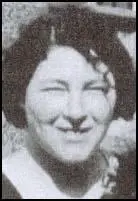Rose Kerrigan

Rose Kerrigan was born in Ireland in 1903. Her father was a Jewish tailor and his business went bankrupt in 1914. She left school at fourteen and she worked in a department store but was sacked for her anti-war activities. As a teenager she became involved in the Glasgow rent strike.
Rose joined the Communist Party of Great Britain in 1923. She married fellow-member, Peter Kerrigan, in 1926. During the 1926 General Strike he became one of the leaders of the Glasgow Strike Committee. He was also involved in organizing the Hunger Marches in the early 1930s.
Peter Kerrigan became active in the Amalgamated Engineering Union (AEU) and in 1927 was elected to the Executive of the CPGB. She later explained: "I've never stopped my husband... because I have the same views as him. He became a professional revolutionary and we lived on very little money, when he was a skilled engineer and could have earned good money... I've always just turned out and done my bit to keep the finances going and keep our heads above water as it were financially."
In 1929, Kerrigan attended the Lenin School in Moscow, and the following year, he was appointed the CPGB's Scottish Organiser. In 1935 Rose spent time in the Soviet Union when her husband became the CPGB's representative to the Comintern.
On the outbreak of the Spanish Civil War her husband became a Political Commissar in the International Brigade whereas Rose raised money for the cause. Later he was employed by the Daily Worker as the newspaper's war correspondent. His experiences in Spain resulted in turning his hair white, which remained with him for the rest of his life. "There was a terrible change in him... he was quite morose... this was because of the people he'd seen who had died in Spain, with having to take their effects home and with having to go and see some of their people."
During the Second World War she worked as a collector for an insurance company, where she organised the first women's branch of the staff union. Later she worked in a clothing factory. As well as remaining in the Communist Party of Great Britain she was active in the Campaign for Nuclear Disarmament.
Rose Kerrigan died in 1995.

